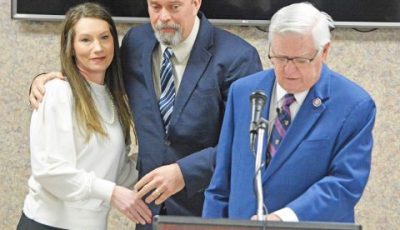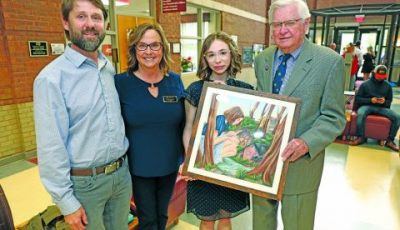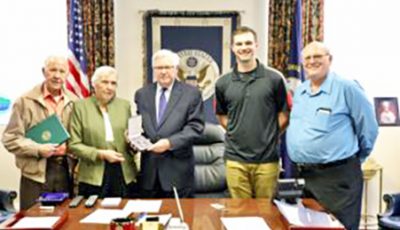Hal Rogers sponsors Black Lung bill named for Whitley Co. native
A Whitley County coal miner who died in 2018 of complications from Black Lung Disease before he could obtain his federal Black Lung Benefits is being honored with a congressional bill that would streamline the process for affected miners to secure their benefits.
 During a press conference Tuesday at the Williamsburg Tourism Center, Congressman Harold “Hal” Rogers, R-Ky, announced that he had filed H.R. 6791, entitled the, “John ‘J.L.’ White Ensuring Timely Black Lung Benefits Act.”
During a press conference Tuesday at the Williamsburg Tourism Center, Congressman Harold “Hal” Rogers, R-Ky, announced that he had filed H.R. 6791, entitled the, “John ‘J.L.’ White Ensuring Timely Black Lung Benefits Act.”
J.L. White, of Williamsburg, was a bulldozer operator on a surface mine who later rose to become a foreman.
“In my eyes, my dad was the hardest working person I have or will ever know,” said Johnna Robinson, who attended Tuesday’s event along with other members of the White family. “He believed in putting in an honest day’s work every day whether it was at his job or back home on the family farm.”
“He always spoke very fondly and very highly of his time working in the coal mines,” Robinson said of her father.
Robinson explained that J.L. was diagnosed with Black Lung and cancer in November 2018 and, though he applied for the federal Black Lung benefits soon after, he died on June 5, 2019 before he was approved to receive them.
Robinson said as the process continued, the red tape made the process overwhelming.
On the advice of a family member, Robinson reached out Tonya Owens in Rogers’ Prestonsburg office, who specializes in aiding miners and the families of miners in going through the process.
In August, 2021, J.L.’s family received the benefits, which Robinson said enabled her to pay off her father’s final expenses and close his estate.
“While frustrating, I thought about how frustrating must be to families with living miners that had medical bills and needs that they needed met,” Robinson said.
Whitley County Judge-Executive Pat White, Jr. also attended the event as J.L. White was his uncle.
“J.L. White was a hero to much of the White family,” Judge White said. “Invincible, hard working and dedicated to whatever he set his hands to. He was an example to me and he was an example to young men all over our area.”
Judge White said it was Uncle J.L. that enabled him to complete his pursuit of a law degree.
In 2002, Pat White, Sr. was diagnosed with lung cancer and forced to stop down from running the family lumber business as Judge White prepared to go back Salmon P. Chase College of Law at Northern Kentucky University for his third and final year of law school.
“J.L. White stepped up as I was planning on not going back for my third year of law school and said, ‘I’ll help you run that business,’” Judge White explained.
“He was there for me when I needed him,” Judge White said of J.L.
Rogers noted that since federal Black Lung benefits were first made available in 1973, approximately 119,000 Kentucky coal miners have applied for them.
Rogers said the legislation, which is co-sponsored by Congressman Stanford Bishop, (D-GA), will speed up the process to get the necessary benefits to the miners and their families.
One of the biggest hurdles is for the U.S. Department of Labor is to determine which mining companies are responsible in a particular case.
The legislation requires that the miners receive their benefits no more than 60 days after being approved even if the Department of Labor has yet to pinpoint the responsible party.
The benefits would be paid out of the federal Black Lung Disability Fund which would be reimbursed once the responsible party in a given case is determined.
If no responsible party is determined, the miner would continue to receive benefits paid out of the trust fund.
Rogers noted that once a miner has been approved for Black Lung benefits, Medicare will not cover the costs of medical care associated with Black Lung, including inhalers.
Rogers added that each year his office receives calls from dozens of Kentucky miners and their families seeking assistance with their Black Lung cases.
“We owe these people a debt of gratitude for their work,” Rogers said, noting that miners are still working in eastern Kentucky and that contributes to the relatively low energy costs.
Rogers added that the federal government must also do everything possible to get more miners back to work noting that China, India, Indonesia, Japan and Vietnam are leading the drive to bring more coal fired power plants on line.
Rogers said China alone is building 43 new coal fired plants.
“Rather than trying to beg Russia or China or Iran for oil, we ought to beg Kentucky coal miners to go back to work,” Rogers said.
“The U.S. still has plenty of black gold in these mountains that can be mined, profitably,” he said.








